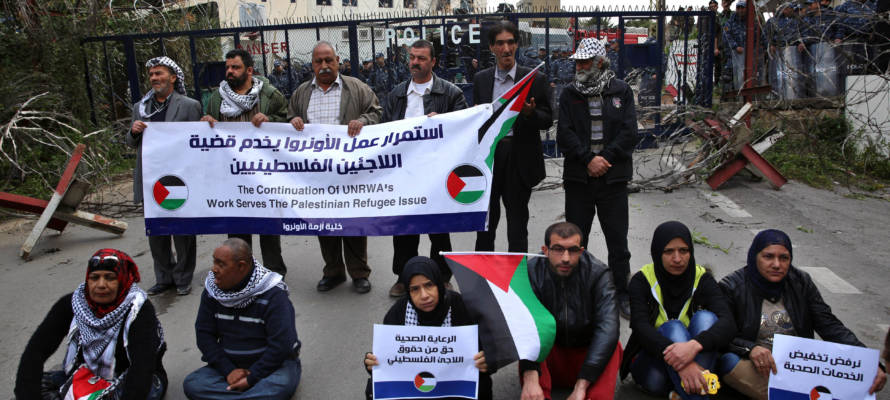“Palestinians in Lebanon do not enjoy several important rights; for example, they cannot work in as many as 39 professions and cannot own property.” — UNRWA
By Khaled Abu Toameh, The Gatestone Institute
From time to time, Lebanese officials and politicians like to take a shot at the Palestinians by reminding them that they are unwelcome in Lebanon, an Arab country that has long been subjecting them to apartheid and discriminatory laws, policies and measures.
The latest Lebanese official to spew “racist” remarks against the 475,075 Palestinians living in 12 refugee camps in Lebanon is Gebran Bassil, leader of the Free Patriotic Movement, a political party whose support base is overwhelmingly from Lebanon’s Christian community.
Bassil, a former minister of foreign affairs and emigrants, is married to Chantel Aoun, the daughter of Lebanese President Michel Aoun.
Palestinians are now accusing Bassil of waging a “racist and malicious campaign of incitement” against them after he was recently quoted as saying that the presence of Palestinian refugees in Lebanon threatens its security and stability.
They fear that Bassil’s statement could pave the way for the expulsion of Palestinians from Lebanon. For several years now, Palestinian refugees, due to dire economic conditions, have been leaving Lebanon in droves and heading for Europe. Bassil and his Lebanese colleagues are undoubtedly happy to see the Palestinians fleeing Lebanon, and would probably like to see more of them leave.
“The principle of neutrality [in regional conflicts] in Lebanon could succeed if the neighboring countries recognized it and applied it by removing the explosive elements [from Lebanon],” Bassil said, adding that one of the “explosive elements” is the Palestinian presence there.
Bassil’s anti-Palestinian statements began after he met with Lebanon’s senior Christian cleric, Patriarch Bechara Boutros Al-Rai, who recently criticized the Lebanese Hezbollah Shiite terrorist group for its support for Iran in conflicts with Sunni-led Gulf states. Al-Rai called for the principle of neutrality and to eliminate poverty and hunger in Lebanon.
Bassil, who is allied with Lebanon’s ruling group, Hezbollah, was apparently unhappy with the Christian leader’s criticism of the Iran-backed terrorist group. His anti-Palestinian remarks indicate that he believes the Palestinians, and not Hezbollah, which functions as a state-within-a-state in Lebanon, are Lebanon’s real problem.
The Palestinian Authority leadership, as part of its policy of maintaining relations with all Arab states, including Lebanon, has refrained from commenting on racist statements made by Lebanese officials and politicians. Now, however, Palestinian officials have decided to break their silence to respond to the “racist campaign of incitement” by Lebanese politicians against Palestinians.
The PLO condemned Bassil’s statements as “provocative and abhorrent” and warned that such rhetoric was harmful to brotherly relations between the Palestinians and Lebanese.”
General Munir al-Makdah, a senior commander of the Palestinian Fatah faction in Lebanon, strongly denounced Bassil’s statements and claimed they were part of an attempt to involve Palestinians in Lebanon’s internal affairs. “We will not meddle in Lebanon’s internal affairs,” al-Makdah said. “We will remain committed to Lebanon’s security in the same way we care about our Palestinian issue.”
Yusef Wahbe, Chairman of the Palestinian Democratic Youth Union in Lebanon, said that Bassil’s “racist” statements harm Palestinian-Lebanese relations. Wahbe urged Lebanese politicians to “stop using Palestinians in their conflicts.” He also called on Bassil to “reconsider” his position and stop inciting against the Palestinians.
“There is fear that such recurring statements would create hatred between Palestinians and Lebanese,” remarked journalist Hanan Issa, a reporter for the independent Arab Al-Ghad television station. “Recently, several anti-Palestinian statements have been made by Lebanese officials.”
Lebanese journalist Ahmed Asfahani, explained that racism in Lebanon “is not limited to this person or a number of leaders.”
The Palestinians in Lebanon, Asfahani said, are already suffering because they are denied access to many jobs. “The political mentality of the Lebanese leaders is directed against Palestinian and Syrian refugees instead of dealing with the deteriorating political and economic situation,” he added.
‘Racist Political System’
According to the United Nations Relief and Works Agency for Palestine Refugees (UNRWA), “Palestinians in Lebanon do not enjoy several important rights; for example, they cannot work in as many as 39 professions and cannot own property (real estate).”
Lebanese law considers Palestinians workers as “foreign workers” and bans them from working in professions such as medicine, law, and engineering, and even as barbers and taxi drivers. “Lebanon has an elaborate racist political system designed to discriminate against Palestinians,” said Zaher Abu Hamdeh, a Palestinian refugee and journalist in Lebanon.
In 2018, Bassil enraged Palestinians by calling on UNRWA to remove from its list every Palestinian who obtains citizenship of any country. Such a move, Bassil said, would “contribute to reducing the financial burdens of UNRWA and the number of Palestinian refugees in Lebanon.”
Earlier this year, another prominent Christian Lebanese politician, Samir Geagea, drew severe criticism from Palestinians after he called for “isolating” Palestinian refugee camps in Lebanon in order to curb the spread of the coronavirus pandemic. Geagea, too, was accused of promoting “racism” and hate” against the Palestinians.
In another sign of anti-Palestinian racism, a Lebanese newspaper published in April a cartoon that likened Palestinians to the coronavirus, sparking outrage among many Palestinians and even some Lebanese. The newspaper has refused to apologize or remove the cartoon.
Lebanon’s anti-Palestinian sentiments show that it has no intention of helping the Palestinians who are living there. On the contrary, the statements of Bassil and other Lebanese politicians demonstrate that Lebanon is eager to rid itself of its Palestinian residents, the sooner the better. Like most Arab countries, Lebanon cares nothing about the suffering of the Palestinians. Other than lip service, it is not prepared to make the slightest effort to assist them.
Israel Not Responsible, Why Should UN Care?
The international community evidently has no problem with Arab racism and discrimination against the Palestinians. Indeed, why should the international community, specifically the UN, care about this — after all, it is a situation about which Israel cannot be held responsible. If and when the Palestinians are ever deported from Lebanon, they can point the finger of blame not only at Lebanese politicians, but also at the international community — which makes a habit of ignoring Arab racism and oppression against them.
MAKE THE LAND OF ISRAEL EVEN MORE BEAUTIFUL!
PLANT YOUR VERY OWN FRUIT TREES IN ISRAEL!
Farmers near the Gaza border lost family, friends and workers. Spring is here, and they desperately need help to replant the farms. Join us in blessing the People and Land of Israel.
“I will ordain My blessing for you…” (Leviticus 25:4)



